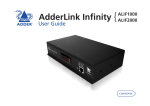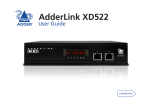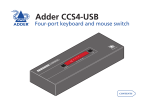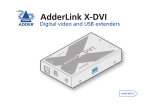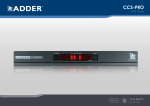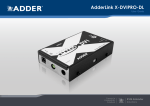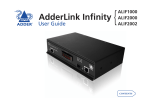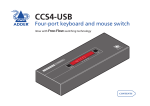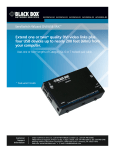Download ADDER AdderLink XD150 User guide
Transcript
AdderLink XD150 User Guide Experts in Connectivity Solutions Extender Solutions Indicators..............................................................................................................16 Further information Getting assistance...............................................................................................17 Appendix 1 - Options port pin-out................................................................18 Appendix 2 - Link cable interference protection.........................................19 Warranty...............................................................................................................20 Safety information...............................................................................................20 Radio frequency energy.....................................................................................21 Index CONFIGURATION Locations.................................................................................................................7 Connections...........................................................................................................8 Local video connection..................................................................................8 Local USB connection....................................................................................8 Local audio connection..................................................................................9 Local serial port connection.........................................................................9 Local data link connection............................................................................9 Local power connection..............................................................................10 Remote video connection...........................................................................11 EDID management..................................................................................11 Remote USB connections...........................................................................11 Remote audio connection...........................................................................12 Remote serial port connection..................................................................12 Remote data link connection.....................................................................12 Remote power connection.........................................................................13 Operation OPERATION Installation Mode switch settings..........................................................................................14 Firmware upgrades.............................................................................................15 FURTHER INFORMATION Welcome.................................................................................................................2 AdderLink XD150 features.................................................................................3 Tips for achieving good quality links.................................................................4 Supplied items........................................................................................................5 Optional extras......................................................................................................6 Configuration INDEX Introduction INSTALLATION Contents 1 Introduction CONFIGURATION See also: • Tips for achieving good quality links • Mode switch settings OPERATION The AdderLink XD150 extenders provide two operational modes so that you can choose your priority: To support a higher resolution display (up to 1920 x 1200 @ 60Hz) or to cover a greater distance (up to 150 meters). A simple switch setting on the local module determines the required mode. When the high rate mode is enabled, the XD150 system will continually monitor the data link to ensure that image quality is being maintained. If the data link is not sufficient, the local module will automatically fall back to long reach mode. FURTHER INFORMATION Thanks to our long involvement and investment in extender technology we have succeeded in overcoming the numerous problems associated with extending high speed signals. The AdderLink XD150 extender modules are totally transparent in operation, leaving you free to use your computer as though you’re still sitting next to it. Higher rate or longer reach? INDEX Thank you for choosing the AdderLink XD150 extender modules. These compact modules allow you to transfer the following connections up to 150 meters from your computer via a single link cable: • High quality single link DVI digital video, • USB keyboard and mouse plus two other USB devices (up to version 2.0), • An RS232 serial device at speeds up to 115200 baud, • Stereo speakers. INSTALLATION WELCOME 2 ADDERLINK XD150 FEATURES The local and remote modules are contained within slimline metal casings that measure just 169 x 116 x 31mm. Options port Used for RS232 serial devices. See Local serial port connection for further details. USB ports Connect your USB keyboard, mouse and other devices. See Remote USB connections for further details. USB port Connects to a USB port on your computer. See Local USB connection for further details. USB ports Connect your USB keyboard, mouse and other devices. See Remote USB connections for further details. INSTALLATION Status indicators These provide visual confirmation of various system functions. See Indicators for further details. Audio port Connects to your speakers. See Remote audio connection for further details. Power input See Local power connection for further details. Upgrade port Used for firmware upgrades to both modules. See Firmware upgrades for further details. Video port Connects to the DVI-D video output port of your computer. See Local video connection for further details. Audio port Connects to the speaker/audio output port of your computer. See Local audio connection for further details. Power input See Remote power connection for further details. Options port Video port Used for RS232 Connects to serial devices. See your DVI-D Remote serial video display. See port connection Remote video for further details. connection for further details. CATx link to local module Do not connect to network devices of any kind. See Remote data link connection for further details. INDEX FURTHER INFORMATION Mode switches These allow you to determine specific behaviors. See Mode switch settings for further details. Status indicators These provide visual confirmation of various system functions. See Indicators for further details. CONFIGURATION CATx link to Recessed remote module reset Do not connect to button network devices of any kind. See Local data link connection for further details. Remote module OPERATION Local module 3 TIPS FOR ACHIEVING GOOD QUALITY LINKS Long reach mode •CAT7a, CAT6a or CAT5e solid core bulk cable •24AWG (Ø 0.5106mm) or thicker cores •U/UTP, F/UTP or better screening •Maximum of two CAT7a patch connections Please see Appendix 2 - Link cable interference protection for details about cable screening and shielding. INDEX As mentioned above, patch links affect performance. For each additional break/patch within a run, you will need to reduce the distance given above by roughly 5 meters. For best results, patch cables should be of type CAT 7a and be less than 2 meters in length. If patch cables are greater than 2 meters, then they must be CAT 7a. Adder recommend the following CAT 7 shielded, foiled, twisted pair cables: • Flexible patch cable Daetwyler 7702 (26AWG S/FTP) • Bulk cable Daetwyler 7120 (23AWG S/FTP) FURTHER INFORMATION Patch cables OPERATION High rate mode •CAT7a solid core bulk cable •23AWG (Ø 0.574mm) or thicker cores •S/FTP, S/STP or PiMF screening •Maximum of two CAT7a patch connections CONFIGURATION INSTALLATION Due to the large volumes of data that must be transferred between the local and remote modules, every AdderLink XD150 installation is highly dependent upon good quality CATx cable links.Video performance is particularly reliant on high speed communication channels. For this reason, the AdderLink XD150 units test the link quality to determine which of two transfer modes can be supported: High rate or Long reach. The main factors that affect link quality are: • The length and type of CATx cable used, • The number, length and type of intermediate patch connections, • The quality of the cable terminations. 4 AdderLink XD150 local module OPERATION 2 x Power adapter with locking connector and country-specific power cord CONFIGURATION INSTALLATION SUPPLIED ITEMS Video cable DVI-D to DVI-D FURTHER INFORMATION USB cable 2m (type A to B) INDEX AdderLink XD150 remote module Information wallet containing: Eight self-adhesive rubber feet Safety document 5 INSTALLATION OPTIONAL EXTRAS Serial cable 2m Part number:VSC40 Single link DVI-D to DVI-D video cable Part number:VSCD1 OPERATION Country-specific power cords CAB-IEC-AUS (Australia) CAB-IEC-EURO(Central Europe) CAB-IEC-UK (United Kingdom) CAB-IEC-USA (United States) CAB-IEC-JAPAN(Japan) FURTHER INFORMATION Replacement power adapter with locking connector Part number: PSU-IEC-12VDC-1.5A CONFIGURATION Audio cable 2m (3.5mm stereo jacks) Part number:VSC22 INDEX USB cable 2m (type A to B) Part number:VSC24 6 Installation CONFIGURATION OPERATION FURTHER INFORMATION INDEX Please consider the following important points when planning the position of the AdderLink XD150 modules: • Situate the local module close to the system to which it will be connected and near to a source of mains power. Place the remote module in similar close proximity to the peripherals that it will connect with, plus a source of mains power. • Consult the precautions listed within the Safety information section. INSTALLATION LOCATIONS 7 CONNECTIONS From USB socket on your host computer From video output socket on your host computer CONFIGURATION To connect the USB port 1 Connect the supplied USB cable between the USB port on the local module rear panel and a vacant USB socket on your host computer. OPERATION To connect the video port 1 Connect the supplied digital video link cable between the DVI-D socket on the local module rear panel and the DVI-D video output socket of your host computer. If USB connectivity is required, then a single USB connection is necessary between the local module and your computer; the AdderLink XD150 remote module acts as a USB 2.0 hub and thus provides four sockets for your peripherals. FURTHER INFORMATION When operating in High Rate mode, AdderLink XD150 can support one Single Link DVI video display at pixel clocks up to 165MHz (equivalent to a maximum resolution of 1920 x 1200 at 60Hz - aka ‘WUXGA’). If the Long Reach mode is selected, pixel clocks up to 148.5MHz (equivalent to a maximum resolution of 1920 x 1080 at 60Hz - aka ‘1080P’) are supported. This allows greater separation between the local and remote modules to be achieved. Please see the section Mode switch settings for details. Local USB connection INDEX Local video connection INSTALLATION Connections do not need to be carried out in the order given within this guide, however, where possible connect the power in as a final step. The local module connects to your computer while the remote module links with your peripherals. 8 To connect the audio port 1 Connect an audio link cable (Adder part number:VSC22) between the audio socket on the local module rear panel and the speaker/audio output socket of your host computer. From audio output on your computer Local data link connection The local and remote modules require a direct connection between them using standard CATx cables and connectors. This is a proprietary data link and is NOT network compatible; the modules must NEVER be connected to any networking equipment, such as switches and routers. When operating in High Rate mode, AdderLink XD150 can support cable distances up to 100 meters. If the Long Reach mode is selected, the separation between the local and remote modules can be increased to 150 meters. Best results will be gained when single lengths of CAT7 cable are used without the need for patch cables. To connect the data link cable 1 Connect the CATx cable from the remote module to the LINK port on the front panel of the local module. INSTALLATION The AdderLink XD150 modules support stereo speakers. A connection to the audio output port of the host computer is required at the local module. CONFIGURATION Local audio connection To connect the serial port 1 Use the optional serial cable (VSC40) to link the Options port on the rear panel of the local module with a vacant RS232 serial port on your host computer. This is NOT an ethernet/network port and must NEVER be connected to any networking equipment. From AdderLink XD150 remote module FURTHER INFORMATION The Options port provides an RS232 serial connection with the remote module. When serial devices are attached to the Options ports on the local and remote modules, the units transparently convey the signals between them, via the CATx link, at rates up to 115200 baud - no serial configuration is required. An optional serial cable (part number: VSC40) is available from Adder. OPERATION Local serial port connection INDEX This is NOT an ethernet/network port and must NEVER be connected to any networking equipment. From the serial port of your host computer Please see Appendix 1 for pin-out details of the Options port. 9 Local power connection There is no on/off switch on either of the AdderLink XD150 modules, so operation begins as soon as power is applied. The power adapters supplied with the modules use locking-type plugs to help prevent accidental disconnections; please follow the instructions given right whenever disconnecting a power adapter. INSTALLATION To disconnect the power adapter 1 Isolate the power adapter from the mains supply. 2 Grasp the outer body of the power adapter plug where it connects with the module. 3 Gently pull the body of the outer plug away from the module. As the body of the plug slides back, it will release from the socket and you can fully withdraw the whole plug. Gently pull back the plug outer body to release the lock CONFIGURATION To connect the power adapter 1 Attach the output plug of the supplied power adapter to the power input socket on the left side of the rear panel. 2 If any mode changes need to be made, adjust the switch settings before applying power to the local module. Please see the section Mode switch settings for details. 3 Connect the IEC connector of the supplied country-specific power cord to the socket of the power adapter. INDEX IMPORTANT: Please read and adhere to the electrical safety information given within the Safety information section of this guide. In particular, do not use an unearthed power socket or extension cable. Note: Both the modules and the power supplies generate heat when in operation and will become warm to the touch. Do not enclose them or place them in locations where air cannot circulate to cool the equipment. Do not operate the equipment in ambient temperatures exceeding 40 degrees Centigrade. Do not place the products in contact with equipment whose surface temperature exceeds 40 degrees Centigrade. FURTHER INFORMATION OPERATION From the power adapter 4 Connect the power cord to a nearby main supply socket. 10 Remote USB connections The remote module contains a USB hub that can support up to four v1.1 or v2.0 USB devices (in any combination). All four USB sockets are identical in operation. To connect USB devices 1 Connect your USB keyboard, mouse and any other two USB devices to the four sockets distributed on the front and rear panels of the remote module. INSTALLATION A Single Link DVI-D port is provided on the rear panel of the remote module. The bandwidth available at the port is determined by the video input at the local module and also the mode in which the AdderLink XD150 system is running. When high rate mode is used, the modules will continually check the link quality to ensure that it is capable of supporting the higher pixel clock. If excessive data errors are detected, the modules will fall back to Long Reach mode until the local module is reset or the link is broken and reestablished. AdderLink XD150 can support one Single Link DVI video display at pixel clocks up to 165MHz (equivalent to a maximum resolution of 1920 x 1200 at 60Hz - aka ‘WUXGA’) when operating in High Rate mode. If the Long Reach mode is selected, pixel clocks up to 148.5MHz (equivalent to a maximum resolution of 1920 x 1080 at 60Hz - aka ‘1080P’) in order to allow greater separations between the local and remote modules to be achieved. Please see the section Mode switch settings for details. Rear panel To connect the video display 1 Connect the DVI-D video cable from your video display to the video output port on the rear panel of the remote module. FURTHER INFORMATION OPERATION From USB devices CONFIGURATION Remote video connection From your video display Front panel When a remote module is connected and the video display attached to it is detected, the EDID (Extended Display Identification Data) information is cloned and stored at the local module. Once this is done, a transparent DDC/CI (Display Data Channel/Command Interface) two way communication link is provided between the video display and the video source (your host computer). If the remote monitor is removed then the cloned EDID stored at the local module will still be presented to the video source. From USB devices INDEX EDID management 11 To connect your speakers 1 Connect your speakers to the audio socket on the remote module rear panel. From your speakers Remote data link connection The local and remote modules require a direct connection between them using standard CATx cables and connectors. This is a proprietary data link and is NOT network compatible; the modules must NEVER be connected to any networking equipment, such as switches and routers. When operating in High Rate mode, AdderLink XD150 can support cable distances up to 100 meters. If the Long Reach mode is selected, the separation between the local and remote modules can be raised up to 150 meters. Best results will be gained when single lengths of CAT7 cable are used without the need for patch cables. To connect the data link cable 1 Connect the CATx cable from the local module to the LINK port on the rear panel of the remote module. INSTALLATION The AdderLink XD150 modules support stereo speakers. CONFIGURATION Remote audio connection To connect the serial port 1 Use the optional serial cable (VSC40) to link the Options port on the rear panel of the remote module with your RS232 serial device. From AdderLink XD150 local module This is NOT an ethernet/network port and must NEVER be connected to any networking equipment. FURTHER INFORMATION The Options port provides an RS232 serial connection with the local module. When serial devices are attached to the Options ports on the local and remote modules, the units transparently convey the signals between them, via the CATx link, at rates up to 115200 baud - no serial configuration is required. An optional serial cable (part number: VSC40) is available from Adder. OPERATION Remote serial port connection INDEX This is NOT an ethernet/network port and must NEVER be connected to any networking equipment. From your serial device Please see Appendix 1 for pin-out details of the Options port. 12 Remote power connection There is no on/off switch on either of the AdderLink XD150 modules, so operation begins as soon as power is applied. The power adapters supplied with the modules use locking-type plugs to help prevent accidental disconnections; please follow the instructions given right whenever disconnecting a power adapter. INSTALLATION To disconnect the power adapter 1 Isolate the power adapter from the mains supply. 2 Grasp the outer body of the power adapter plug where it connects with the module. 3 Gently pull the body of the outer plug away from the module. As the body of the plug slides back, it will release from the socket and you can fully withdraw the whole plug. Gently pull back the plug outer body to release the lock CONFIGURATION To connect the power adapter 1 Attach the output plug of the supplied power adapter to the power input socket on the left side of the rear panel. IMPORTANT: Please read and adhere to the electrical safety information given within the Safety information section of this guide. In particular, do not use an unearthed power socket or extension cable. Note: Both the modules and the power supplies generate heat when in operation and will become warm to the touch. Do not enclose them or place them in locations where air cannot circulate to cool the equipment. Do not operate the equipment in ambient temperatures exceeding 40 degrees Centigrade. Do not place the products in contact with equipment whose surface temperature exceeds 40 degrees Centigrade. 3 Connect the power cord to a nearby main supply socket. INDEX 2 Connect the IEC connector of the supplied country-specific power cord to the socket of the power adapter. FURTHER INFORMATION OPERATION From the power adapter 13 Configuration MODE SWITCH SETTINGS Changes to the mode switches are not recognized until you re-apply power to the local module. OPERATION Note:The default position for both switches is UP, thus selecting Long reach mode and high speed (normal) USB mode. CONFIGURATION Local module rear panel INSTALLATION The local module has two small switches on its rear panel. These are used to determine which operation modes should be used.You will need to re-power the local module whenever a switch setting is changed. UP - Normal mode - Use this if the modules are not connected to a KVM switch. DOWN - Compatibility mode - Use this if either the local or remote modules are connected to a KVM switch. This mode ensures robust and reliable operation with KVM switches but also reduces the maximum USB data rate. Determines the priority for the data link: Longer distance or higher screen resolution. UP - Long reach mode - Limits the pixel clock (148.5MHz) so that longer stretches of link cable (exceeding 100m) can be used. This will restrict the achievable screen resolution to a maximum of 1920 x 1080 at 60Hz (aka ‘1080P’). DOWN - High rate mode - Allows a higher pixel clock (165MHz) to support screen resolutions of up to 1920 x 1200 at 60Hz (aka ‘WUXGA’). This will limit the maximum link cable length to around 100m or less, depending on the type of link cable used. Note:When high rate mode is used, the modules will continually check the link quality to ensure that it is capable of supporting the higher pixel clock. If excessive data errors are detected, the modules will fall back to Long Reach mode until the local module is reset or the link is broken and re-established. FURTHER INFORMATION Determines whether USB compatibility mode should be used. Switch B Link mode INDEX Switch A USB compatibility mode 14 FIRMWARE UPGRADES If the firmware upgrade fails 1 Check that the CATx cable is correctly connected between the LINK sockets of the local and remote modules and that power is applied to both modules. 2 On the front panel of the local module, re-press the recessed reset button for approximately 10 seconds to re-invoke upgrade mode. The module should again be declared on your computer as a mass storage device with the volume label ‘FIRMWARE’. 3 Follow step 5 above. • If the upgrade process fails again, contact Adder technical support for assistance. CONFIGURATION If the upgrade process encounters an error then one or more of the indicators on the local module front panel will flash rapidly, i.e. they will cease chasing in sequence. OPERATION Errors during the upgrade process FURTHER INFORMATION 4 On the front panel of the local module, use a small implement or straightened paperclip to press and hold the recessed reset button for approximately 10 seconds. The front panel indicators will begin to flash in sequence: The outer two followed by the inner two and so on. The module should be declared on your computer as a mass storage device with the volume label ‘FIRMWARE’. 5 Use your computer’s file manager application to copy the upgrade file downloaded earlier to the mass storage device that has the volume label ‘FIRMWARE’. Once the local module has received all of the data, the front panel indicators of the local module will chase from side to side to show that the upgrade procedure is underway. 6 Once the upgrade has been successfully completed both modules will reset themselves and return to normal operation. INDEX To enter upgrade mode 1 On your computer, download the latest AdderLink XD150 upgrade file from adder.com. 2 Connect the local and remote modules together using a CATx cable, and power on both modules. It’s not important whether any peripherals (if any) are attached to either module. 3 Connect the local module to your computer using the mini USB socket on the rear panel and a USB type-A to mini-B cable (not supplied). INSTALLATION Both modules can be upgraded simultaneously by linking them together and then connecting them to your computer using a USB type-A to mini-B cable. IMPORTANT: During the upgrade process, do not remove power from either module. 15 Operation INSTALLATION The AdderLink XD150 modules are designed to be transparent in operation. Providing the link cable is sufficient to reliably carry the signals across the separation distance, all peripherals should respond exactly as they would when situated next to your host computer. INDICATORS Red status indicators Green and amber status indicators The green and amber status indicators on the link connectors of each module provide further status information: Activity This indicator will flash when there is USB data flowing between the modules. USB This indicator will be on once the USB extender and hub located within the remote module have been successfully enumerated by the USB host on your computer. Link This indicator will be on once a good link exists between the local and remote modules. Amber This indicator will flash when video data is being transferred between the modules. Green This indicator will be on whenever there is a good link between the local and remote modules. INDEX Power This indicator will be on when power is supplied to each module. FURTHER INFORMATION OPERATION The red status indicators on the front panels of each module mostly behave in the same manner at the same time: CONFIGURATION The local and remote modules contain various indicators to provide you with status information. Both modules have four red indicators on their front panels; both also have green and amber indicators on the link connectors. 16 Further information • Technical support – www.adder.com/contact-support-form For technical support, use the contact form in the Support section of the adder.com website - your regional office will then get in contact with you. CONFIGURATION • Adder Forum – forum.adder.com Use our forum to access FAQs and discussions. OPERATION • Online solutions and updates – www.adder.com/support Check the Support section of the adder.com website for the latest solutions and firmware updates. FURTHER INFORMATION If you are still experiencing problems after checking the information contained within this guide, then we provide a number of other solutions: INSTALLATION GETTING ASSISTANCE INDEX This chapter contains a variety of information, including the following: • Getting assistance - see right • Appendix 1 - Options port pin-out • Appendix 2 - Link cable interference protection • Safety information • Warranty • Radio frequency energy statements 17 Signal 1 2 3 4 5 6 7 8 Not used 5VDC power output (100mA max) GND reference for all signals RS232 (RXD) data receive Not used Not used RS232 (TXD) data transmit Not used Not used Not used 1 2 3 4 5 6 7 8 9 10 CONFIGURATION OPTIONS 8p8c 10p10c OPERATION 10 FURTHER INFORMATION 1 INDEX The OPTIONS port uses a 10p10c socket which can accommodate both 10p10c connectors as well as the much more common 8p8c connectors, which are used on Ethernet leads and patch cables. The pin-outs are listed in this section for both types of connector. Note: Although the pins labeled ‘Not used’ are inactive, they are still connected internally and so no links should be made at all to these pins. INSTALLATION APPENDIX 1 - OPTIONS PORT PIN-OUT 18 Overall screening U/UTP û û F/UTP ü û U/FTP û ü S/FTP or S/STP or PiMF ü ü F/UTP CONFIGURATION Pair Shielding Twisted Pair Pair shielding where U = unshielded F = foil shielding S = braided shielding PiMF = Pairs in Metal Foil Overall Screening U/FTP OPERATION U/UTP Name S/FTP S/STP PiMF General cable anatomy Outer sheath Overall screening FURTHER INFORMATION Interference protection codes Interference protection is now classified in the following manner: U/UTP Pair shielding INDEX While the Category rating (e.g. CAT 5e, CAT 6a, CAT 7, etc.) determines the electrical performance of a cable, another vital part of the overall cable specification is its protection from interference. As cabling distances and data rates increase, so too does the susceptibility to interference, from both external and internal sources. Proximity to other electromagnetic sources are the main external threat and these can be subdued using overall screening that surrounds all four of the cable pairs. However, interference is also possible from neighbouring twisted pairs within the same cable and this can be just as hazardous to data integrity. Such crosstalk is countered by shielding each cable pair separately. Within each Category rating, you can specify different combinations of external screening and internal shielding to suit the environment into which the link is being placed. Please see the section Tips for achieving good quality links for suggested combinations. INSTALLATION APPENDIX 2 - LINK CABLE INTERFERENCE PROTECTION 19 • INSTALLATION Adder Technology Ltd warrants that this product shall be free from defects in workmanship and materials for a period of two years from the date of original purchase. If the product should fail to operate correctly in normal use during the warranty period, Adder will replace or repair it free of charge. No liability can be accepted for damage due to misuse or circumstances outside Adder’s control. Also Adder will not be responsible for any loss, damage or injury arising directly or indirectly from the use of this product. Adder’s total liability under the terms of this warranty shall in all circumstances be limited to the replacement value of this product. If any difficulty is experienced in the installation or use of this product that you are unable to resolve, please see the Getting assistance section. CONFIGURATION • • WARRANTY OPERATION • • For use in dry, oil free indoor environments only. Warning - live parts contained within power adapter(s). No user serviceable parts within power adapter(s) - do not dismantle. Plug the power adapter(s) into socket outlets close to the module that they are powering. Do not use an unearthed power socket or extension cable. Do not use a power adapter if its case becomes damaged, cracked or broken or if you suspect that it is not operating properly. Replace the power adapter(s) with a manufacturer approved type only. If you use a power extension cord with the module, make sure the total ampere rating of the devices plugged into the extension cord does not exceed the cord’s ampere rating. Also, make sure that the total ampere rating of all the devices plugged into the wall outlet does not exceed the wall outlet’s ampere rating. Do not attempt to service the modules yourself. FURTHER INFORMATION • • • • INDEX SAFETY INFORMATION 20 FCC Compliance Statement (United States) This equipment generates, uses and can radiate radio frequency energy and if not installed and used properly, that is, in strict accordance with the manufacturer’s instructions, may cause interference to radio communication. It has been tested and found to comply with the limits for a class A computing device in accordance with the specifications in Subpart J of part 15 of FCC rules, which are designed to provide reasonable protection against such interference when the equipment is operated in a commercial environment. Operation of this equipment in a residential area may cause interference, in which case the user at his own expense will be required to take whatever measures may be necessary to correct the interference. Changes or modifications not expressly approved by the manufacturer could void the user’s authority to operate the equipment. CONFIGURATION This equipment has been tested and found to comply with the limits for a class A computing device in accordance with the specifications in the European standard EN55022. These limits are designed to provide reasonable protection against harmful interference. This equipment generates, uses and can radiate radio frequency energy and if not installed and used in accordance with the instructions may cause harmful interference to radio or television reception. However, there is no guarantee that harmful interference will not occur in a particular installation. If this equipment does cause interference to radio or television reception, which can be determined by turning the equipment on and off, the user is encouraged to correct the interference with one or more of the following measures: (a) Reorient or relocate the receiving antenna. (b) Increase the separation between the equipment and the receiver. (c) Connect the equipment to an outlet on a circuit different from that to which the receiver is connected. (d) Consult the supplier or an experienced radio/TV technician for help. OPERATION European EMC directive 2004/108/EC FURTHER INFORMATION A Category 5e (or better) twisted pair cable must be used to connect the units in order to maintain compliance with radio frequency energy emission regulations and ensure a suitably high level of immunity to electromagnetic disturbances. All cables used with this equipment must be shielded in order to maintain compliance with radio frequency energy emission regulations and ensure a suitably high level of immunity to electromagnetic disturbances. INSTALLATION RADIO FREQUENCY ENERGY This equipment does not exceed the class A limits for radio noise emissions from digital apparatus set out in the radio interference regulations of the Canadian Department of Communications. Le présent appareil numérique n’émet pas de bruits radioélectriques dépassant les limites applicables aux appareils numériques de la classe A prescrites dans le règlement sur le brouillage radioélectriques publié par le ministère des Communications du Canada. INDEX Canadian Department of Communications RFI statement 21 INSTALLATION www.adder.com/contact-details Support: forum.adder.com CONFIGURATION Contact: OPERATION www.adder.com INDEX FURTHER INFORMATION Web: Documentation by: www.ctxd.com © 2014 Adder Technology Limited All trademarks are acknowledged. Part No. MAN-XD150-ADDER • Release 1.0a 22 D Data link local module 9 remote module 12 P Patch cable 4 Peripherals connecting 8 Power local module 10 remote module 13 E EDID management 11 F Firmware upgrade 15 H High rate mode 2 M Mode switches 14 R Reset button 3,15 RS232 9,12 U USB local module 8 remote module 11 V Video local module 8 remote module 11 W Warranty 20 CONFIGURATION L Link quality 4 Long reach mode 2 OPERATION C Cable pairs 19 Cable types 19 Category rating 19 CATx 4 Crosstalk 19 S Safety information 20 Screening 19 Serial port local module 9 remote module 12 Shielding 19 Switch settings 14 FURTHER INFORMATION I Indicators 16 Interference protection 19 INDEX A Audio local module 9 remote module 12 INSTALLATION Index 23

























